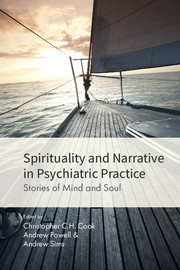Book contents
- Frontmatter
- Contents
- List of contributors
- Foreword
- Preface
- 1 Narrative in psychiatry, theology and spirituality
- 2 Spirituality and transcultural narratives
- 3 Psychopathology and the clinical story
- 4 Helping patients tell their story: narratives of body, mind and soul
- 5 Gods lost and found: spiritual coping in clinical practice
- 6 Stories of joy and sorrow: spirituality and affective disorder
- 7 Stories of fear: spirituality and anxiety disorders
- 8 Stories of transgression: narrative therapy with offenders
- 9 Narratives of transformation in psychosis
- 10 My story: a spiritual narrative
- 11 God's story revealed in the human story
- 12 Meaning without ‘believing’: attachment theory, mentalisation and the spiritual dimension of analytical psychotherapy
- 13 Stories of living with loss: spirituality and ageing
- 14 Beginnings and endings
- Index
1 - Narrative in psychiatry, theology and spirituality
Published online by Cambridge University Press: 02 January 2018
- Frontmatter
- Contents
- List of contributors
- Foreword
- Preface
- 1 Narrative in psychiatry, theology and spirituality
- 2 Spirituality and transcultural narratives
- 3 Psychopathology and the clinical story
- 4 Helping patients tell their story: narratives of body, mind and soul
- 5 Gods lost and found: spiritual coping in clinical practice
- 6 Stories of joy and sorrow: spirituality and affective disorder
- 7 Stories of fear: spirituality and anxiety disorders
- 8 Stories of transgression: narrative therapy with offenders
- 9 Narratives of transformation in psychosis
- 10 My story: a spiritual narrative
- 11 God's story revealed in the human story
- 12 Meaning without ‘believing’: attachment theory, mentalisation and the spiritual dimension of analytical psychotherapy
- 13 Stories of living with loss: spirituality and ageing
- 14 Beginnings and endings
- Index
Summary
We all have stories to tell: our own stories, stories we have heard, stories of what we have seen, stories of what we imagine or dream. The telling of stories, and listening to them, seems to be a fundamentally human activity. It is not necessarily the case that happy stories are better than sad stories, and any story can be told well, or badly. But some stories are important and, in some way, they need to be told and listened to. Among these are stories of difficult, traumatic and emotional experiences, stories of life and death, stories of illness. Storytelling is thus at the heart of both medicine and pastoral care. The doctor, like the priest, needs to be good at listening to stories.
If stories are important, the word ‘narrative’ might immediately appear to be an unhelpful synonym. It sounds more technical and, being employed frequently in academic discourse, could easily be seen to distance the everyday telling of stories from serious academic or professional work. Conversely, it might be understood as a technical term which cuts across various professional and academic disciplines, use of which demonstrates that stories are taken seriously by professionals and academics. This ambiguity is perhaps not unhelpful, for it turns out that narratives, stories, can be told and heard in importantly different ways, some of which are creative and can bring healing, and some of which are harmful and destructive.
Narrative in medicine and psychiatry
Trisha Greenhalgh and Brian Hurwitz (1998) identify a number of important features of a narrative:
There is a finite temporal chronology, with a beginning, a series of events and an end.
It presupposes the existence of narrator and listener, whose differing viewpoints influence how the story is told and heard (another narrator and another listener might tell and respond to the same story quite differently).
There is a concern with characters, with individual people and with how they feel about themselves and others.
Information is provided that is more than simply a definable list of facts directly concerned with events. What is included and not included is important.
It is absorbing and engaging, and invites interpretation.
- Type
- Chapter
- Information
- Spirituality and Narrative in Psychiatric Practice , pp. 1 - 13Publisher: Royal College of PsychiatristsPrint publication year: 2016



